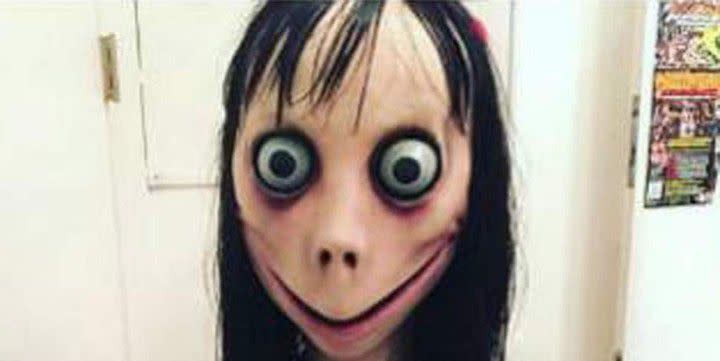Is The Momo Challenge Finally Over?!

The Momo Challenge is a social-first "game" where teens can opt in to receiving threatening messages from a creepy character named Momo.
The challenge has allegedly been linked to several teen suicides, which has alarmed parents.
Some outlets claim that the Momo Challenge is a hoax.
Odds are that you're well aware of the Momo Challenge by now. Maybe you've opted in to receiving weird messages from Momo herself or your parents have warned you about the viral "game" that allegedly has taken the internet by storm.
So... is it possible that this whole Momo situation is really over?
Well, a lot of people are claiming that it never really started in the first place and that the game was actually just a hoax that local news stations fed into to freak out parents and wrack up the views. These trends are “part of a moral panic, fueled by parents’ fears in wanting to know what their kids are up to,” Benjamin Radford, a folklorist and research fellow at the Committee for Skeptic Inquiry, told Rolling Stone. In short: The Momo Challenge is what happens when the Internet takes an idea and runs with it.
It all started with Momo herself, the bug-eyed, grinning chicken lady that has surely been haunting your social feed. She's not a doctored image of a person or a CGI creation made by some Redditor. She's actually a sculpture created by the artist Keisuke Aisawa for the Japanese special-effects company Link Factory. Images of Momo first started circulating in 2016 by people who would visit the company and be freaked out by the large, weird bird woman they had on display.
Then, in 2018, the Momo challenge made headlines when a 12-year-old Argentinian girl reportedly died by suicide because of the "Momo Game" she had been playing. Authorities in Buenos Aires never confirmed whether or not the girl’s suicide was actually connected to the online game.
Other reports from India and Colombia started to trickle in about teens allegedly killing themselves due to their involvement in the game.
News of the threatening challenge continued into 2019 after Free Hess, a Florida mother, told CNN that she saw videos on YouTube and YouTube Kids that gave children instructions on how to kill themselves.
"It makes me angry and sad and frustrated," Hess told CNN on February 25th. "I'm a pediatrician, and I'm seeing more and more kids coming in with self harm and suicide attempts. I don't doubt that social media and things such as this is contributing."
But the tricky thing about of all this is: Can a challenge really make someone do something like take their own life? According to The Atlantic, the basis of this hoax stems from parents feeling afraid of technology and the effect it might have on their kids. They wrote: "Parents have always felt out of touch with younger generations, but smartphones have seemingly widened that gulf. Sixty percent of teens have created accounts for apps or social-media sites without their parents’ knowledge, according to a 2016 study by the National Cyber Security Alliance. And only 13 percent of teenagers believed their parents “understood the extent of their internet use.” That gap in understanding has allowed this very specific type of misinformation to flourish."
Now that more light has been shed on the challenge, people are wondering if it's truly over.
('You Might Also Like',)

